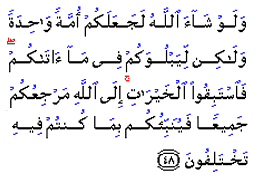Differences in Laws, The Best Of Both Worlds, Ashab al-A`raf, Ashab al-Suffah
Issue 202 » December 27, 2002 - Shawwal 22, 1423
General
Al
Maidah (The Table) Commentary: Source of all Laws (Shariah) is Allah It is a mistake to think that variations in religious laws result from a difference of source. It is God Himself Who altered the legal prescriptions to suit different nations at different times and in different circumstances. Differences: A Means Of Testing People One of the many benevolent considerations keeping the religious laws of various Prophets different from one another was that God wanted this difference to become a means of testing people. Those who understand true religion, who have grasped its spirit and essence, and who are aware of the true importance of the different legal prescriptions, always recognize the Truth and accept it whatever its form. And then there are those who are not conversant with the spirit of true religion and who seem to identify it with a specific body of legal minutiae. In order to distinguish the people of the first category from those of the second God made the legal prescriptions of the various Prophets vary. Real Purpose of Divine Laws The real purpose of all the divine religious laws is the attainment of goodness and righteousness. This purpose can be achieved only when a man obeys whatever commandment he receives from God at a particular time. The proper mode of conduct for people who keep their eyes fixed on this true purpose is to strive for God’s good pleasure rather than quarrel about differences in the legal prescriptions of the various Prophets. Settling Differences The differences which have arisen because of he unjustified rigidity, prejudice and erroneous attitudes of the human mind can be finally settled neither in the debating hall nor on the battlefield. The final judgement will be made by God Himself. Then the reality of everything will be fully uncovered, and it will be clear how much truth and falsehood underlay the squabbles which whole lives were wasted over. Until the day comes when we are all illuminated about our differences of opinion, there is but one possible action: doing good and fighting against whatever gets in the way of the same. The plurality of communities is presented in this verse as the positive, catalyzing factor of a kind of competition for justice. [compiled from "Towards Understanding the Quran" by Sayyid Abul Ala Mawdudi, Vol 2, p. 170] |
The Best of Both Worlds Abdullah ibn Masud, may Allah
be pleased with him, relates that the Prophet, peace be upon him, would
supplicate: Imam as-Sadee (d. 1376 AH), may Allah have mercy on his sould - said in Bahjatul Quloobul-Abraar (p.198) "This dua (supplication) is from the most comprehensive and beneficial duas (supplications), since it includes asking Allah for well-being with regards to both the Religion and the world. Thus, al-huda (the guidance) is beneficial knowledge, and at-tuqa (i.e. taqwa or piety) is righteous actions and leaving-off what Allah and His Messenger have forbidden; and this is (asking) for correctness and well-being of a person's Religion. For indeed, the Religion comprises of beneficial knowledge and recognising the truth - which is guidance - and standing firm upon obedience to Allah and His Messenger - and this is piety. And al-afafa (well-being and safety) and al-ghina (contentment and sufficiency) comprises of being safe from (the harms of) the creation and that the heart is not attached to them. And it also comprises of being contended with Allah and what He provides, and seeking whatever will cause the heart to be satisfied with Him. So with this, happiness in this worldly life is completed, and the heart tastes true sweetness and delight - and this is a goodly life. So whosoever is granted the provision of guidance, piety, well-being and contentment has indeed achieved true happiness, and has acquired all that could be possibly sought after, as well as being saved from all that is dreadful and frightening." [Contributed by Yahya Ibrahim, Australia] |
Ashab al-A`raf Ashab al-A`raf (Heights) will be the people who are neither righteous enough to enter Paradise nor wicked enough to be cast into Hell. They will, therefore, dwell at a place situated between the two. Ashab al-Suffah Ashab al-Suffah consisted of about three or four hundred Companions who spent most of their time in the company of the Prophet (S.A.W.). They acquired knowledge and had dedicated themselves wholly to serving Islam. [Taken from SoundVision.com's "Glossary of Islamic Terms"] |
